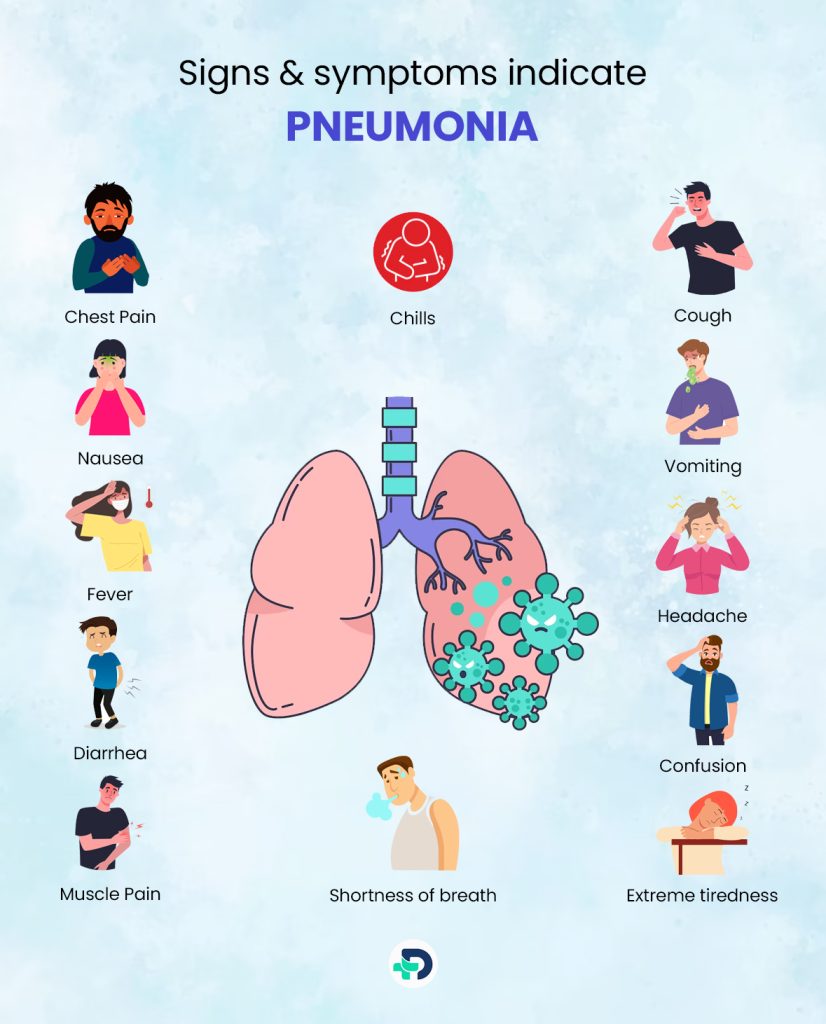Pneumonia: Unveiling Symptoms, Causes, Treatment and Prevention Strategies

- Pneumonia
- 30 Aug 2023
Introduction
What is Pneumonia?
Pneumonia is an infection of the lungs that causes the alveoli or air sacs, in the lungs to fill with pus or fluid. It may be caused by bacteria, viruses, or fungi, and infected people may experience mild to severe symptoms associated with the disease. Infections including the flu, COVID-19, and pneumococcal disease are just a few that can result in Pneumonia. The optimal course of treatment for affected patients is determined by the disease’s underlying cause as well as how severe the illness is. 1Pneumonia | Researched based study from National Institutes of Health 2Pneumonia | Researched based study from Cleveland Clinic

Symptoms

What signs and symptoms indicate Pneumonia?
- Chest pain while breathing/coughing
- Chills
- Cough (with or without mucus)
- Fever
- Shortness of breath
- Headache
- Muscle pain
- Extreme tiredness
- Nausea
- Vomiting
- Diarrhea 1Symptoms | Researched based study from National Institutes of Health
When should you seek medical care?
If you encounter any of the following symptoms associated with Pneumonia, you should seek medical help immediately.
- Trouble breathing or feeling breathlessness while seated still
- Experiencing chest pain that has recently appeared or has gotten worse
- Confusion
- Inability to concentrate 2Symptoms | Researched based study from Cleveland Clinic
Causes
What factors can cause Pneumonia?
Numerous different types of bacteria, viruses, and fungus can cause Pneumonia. Adults are more frequently affected by bacteria, whereas school-aged children are most commonly affected by viruses. Pneumonia is frequently caused by various illnesses, such as:
- The flu
- COVID-19
- Common cold
- Pneumococcal disease
- Pneumocystis pneumonia 2Causes| Researched based study from Cleveland Clinic
Risk Factors
Risk Factors
Anyone can contract pneumonia. However, the following populations are more vulnerable to getting the illness:
- Adults aged 65 years and above
- Children aged below 2 years
- People with specific medical conditions
- Individuals who are smokers 3Risk Factors | Researched based study fromn Johns Hopkins Medicine
Diagnosis
How is Pneumonia diagnosed?
To diagnose the condition, the healthcare provider may collect your medical history and perform a physical examination in addition to certain tests for diagnosing the condition which might include:
- Imaging tests
- Blood tests
- Sputum tests
- Pulse oximetry
- Pleural fluid culture
- Arterial blood gas test
- Bronchoscopy
Imaging tests:
- Imaging tests consist of chest x-ray or CT scan which helps to determine the illness in suspected patients.
Blood tests:
- The doctor might advise blood tests that help with disease diagnosis.
Sputum tests:
- In this test, the patients are encouraged to cough and spit into a container, which is subsequently sent to the lab for studies that help with disease diagnosis.
Pulse oximetry:
- Pulse oximetry is a sensor that monitors the amount of oxygen in the blood that helps the physician to determine the effectiveness of the lung function in an individual suspected with the illness.
Pleural fluid culture:
- During this examination, your doctor will use a tiny needle to draw fluid from the area around your lungs.
- The fluid sample will then be sent to a lab for analysis in order to determine the origin of the infection and help with the diagnosis of the illness.
Arterial blood gas test:
- In this test, your doctor would draw blood from your wrist, arm, or groin to analyze your blood’s oxygen content and assess how well your lungs are functioning to help diagnose the illness.
Bronchoscopy:
- During this examination, the medical professional may see inside your lungs using a bronchoscope, a small, lighted tube.
- To ascertain if the patient has pneumonia, tissue or fluid samples may be collected and tested at a laboratory. 2Diagnosis | Researched based study from Cleveland Clinic
Treatment
How is Pneumonia treated?
Whether you have a bacterial, viral, or fungal infection, and how bad your illness is, your doctor will determine how you are treated for pneumonia.
When the underlying cause is not identified, treatment is often focused on symptom management and preventing the progression of the illness which may include:
- Medications
- Oxygen therapy
- Draining of fluids
Medications:
- Antibiotics – are drugs that are generally recommended by the healthcare provider to treat bacterial pneumonia.
- Antifungal medications – are used to treat pneumonia caused by fungal infections.
- Antiviral medicines – Typically, there is no need for medicine to treat viral pneumonia because it can heal on its own. However, a medical practitioner may suggest antivirals to lessen the length and intensity of a virus infection.
Oxygen therapy:
- Treatments like oxygen therapy help patients with pneumonia by giving them additional or supplemental oxygen.
Draining of fluids:
- A doctor may drain the fluid that is accumulated between the infected person’s lungs and chest wall.
- Surgery or a catheter is generally used to drain the fluids in patients affected by the condition. 1Treatment| Researched based study from National Institutes of Health. 2Treatment| Researched based study from Cleveland Clinic
Complications
Complications of Pneumonia
The following are serious complications of Pneumonia:
- Respiratory failure/acute respiratory distress syndrome (ARDS)
- Pleural effusion (fluid around lungs)
- Sepsis/bacteremia (bacteria in the bloodstream)
- Lung abscess 2Complications | Researched based study from Cleveland Clinic
Prevention
Can Pneumonia be prevented?
Vaccination:
- The strongest defense against the germs and viruses that frequently cause Pneumonia is vaccination.
- There are two different vaccinations (shots) available to protect against Pneumococcal pneumonia that includes Pneumococcal vaccines and vaccinations against viruses, respectively.
In addition to getting vaccinated, adopting a healthy behavior will also lower the chance of developing and transmitting the infection which may include:
- Quitting smoking & avoiding secondhand smoke.
- Washing hands with soap & water before handling/having food.
- Avoiding close contact and not sharing things with others, especially with persons infected with common cold virus, or COVID-19 infection.
- Eating well, getting enough rest, and/or indulging in regular exercise.
- Refraining from consuming alcohol excessively. 2Complications | Researched based study from Cleveland Clinic
Prognosis
Prognosis
The prognosis for Pneumonia is generally good especially in patients who receive immediate care for the disease. However, Pneumonia can become fatal it is left untreated especially in patients who have an underlying cause for the disease. Even those who have undergone a successful course of treatment and made a full recovery from the illness may still experience long-term health problems. Therefore, it is wise to follow up with your healthcare professional if you continue to experience health issues after recovering from the disease. 2Pro gnosis| Researched based study from Cleveland Clinic
Any feedback on this article?
 This Articles content was accurate
This Articles content was accurate Very Informative Article
Very Informative Article I have a question or a comment
I have a question or a comment
 This article contains inaccurate content
This article contains inaccurate content This article was not helpful
This article was not helpful I have a question or a comment
I have a question or a comment
We appreciate your helpful feedback!
Checkout our social pages
References
-
National Institutes of Health
Pneumonia| Symptoms | Treatment
-
Cleveland Clinic
Pneumonia | Causes | Diagnosis | Treatment | Complications | Prevention | Prognosis
-
Johns Hopkins Medicine
Pneumonia| Risk factors




































